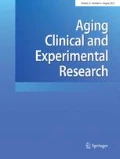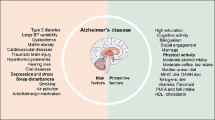Abstract
Montreal cognitive assessment (MoCA) is a test providing a brief screening for people with cognitive impairment due to aging or neurodegenerative syndromes. In Italy, as in the rest of the world, several validation studies of MoCA have been carried out. This study compared, for the first time in Italy, a sample of people with probable Alzheimer’s Disease (AD) with healthy counterparts. The study also compared two community-dwelling groups of aged participants with and without probable cognitive impairment, as discriminated by two cut-off points of adjusted MMSE score. All the comparisons were carried out according to ROC statistics. Optimal cutoff for a diagnosis of probable AD was a MoCA score ≤14. Optimal cutoff for the discrimination of probable cognitive impairment was a MoCA score ≤17 (associated to MMSE cutoff of 23.8). Results confirm the substantial discrepancy in cut-off points existing between Italian and other international validation studies, showing that Italian performance on MoCA seems to be globally lower than that in other Countries. Characteristics of population might explain these results.


Similar content being viewed by others
References
Nasreddine ZS, Phillips NA, Bédirian V et al (2005) The Montreal Cognitive Assessment MoCA: a brief screening tool for mild cognitive impairment. J Am Geriatr Soc 53:695–699
Gil L, Ruiz de Sánchez C, Gil F et al (2015) Validation of the Montreal Cognitive Assessment (MoCA) in Spanish as a screening tool for mild cognitive impairment and mild dementia in patients over 65 years old in Bogotá Colombia. Int J Geriatr Psychiatry 30:655–662
Ng TP, Feng L, Lim WS et al (2015) Montreal Cognitive Assessment for screening mild cognitive impairment: variations in test performance and scores by education in Singapore. Dement Geriatr Cogn Disord 39:176–185
Kaya Y, Aki OE, Can UA et al (2014) Validation of Montreal Cognitive Assessment and discriminant power of Montreal Cognitive Assessment subtests in patients with mild cognitive impairment and Alzheimer dementia in Turkish population. J Geriatr Psychiatry Neurol 27:103–109
Pirrotta F, Timpano F, Bonanno L et al (2015) Italian validation of montreal cognitive assessment. Eur J Psychol Assess 31:131–137
Fujiwara Y, Suzuki H, Yasunaga M et al (2010) Brief screening tool for mild cognitive impairment in older Japanese: validation of the Japanese version of the Montreal Cognitive Assessment. Geriatr Gerontol Int 10:225–232
Freitas S, Simões MR, Alves L et al (2013) Montreal cognitive assessment: validation study for mild cognitive impairment and Alzheimer disease. Alzheimer Dis Assoc Disord 27:37–43
Hu JB, Zhou WH, Hu SH et al (2013) Cross-cultural difference and validation of the Chinese version of Montreal Cognitive Assessment in older adults residing in Eastern China: preliminary findings. Arch Gerontol Geriatr 56:38–43
Lee JY, Lee DW, Cho SJ et al (2008) Brief screening for mild cognitive impairment in elderly outpatient clinic: validation of the Korean version of the Montreal Cognitive Assessment. J Geriatr Psychiatry Neurol 21:104–110
Lifshitz M, Dwolatzky T, Press Y (2012) Validation of the Hebrew version of the MoCA test as a screening instrument for the early detection of mild cognitive impairment in elderly individuals. J Geriatr Psychiatry Neurol 25:155–161
Luis CA, Keegan AP, Mullan M (2009) Cross validation of the Montreal Cognitive Assessment in community dwelling older adults residing in the Southeastern US. Int J Geriatr Psychiatry 24:197–201
Memória CM, Yassuda MS, Nakano EY et al (2013) Brief screening for mild cognitive impairment: validation of the Brazilian version of the Montreal cognitive assessment. Int J Geriatr Psychiatry 28:34–40
Tsai CF, Lee WJ, Wang SJ et al (2012) Psychometrics of the Montreal Cognitive Assessment (MoCA) and its subscales: validation of the Taiwanese version of the MoCA and an item response theory analysis. Int Psychogeriatr 24:651–658
Yeung PY, Wong LL, Chan CC et al (2014) A validation study of the Hong Kong version of Montreal Cognitive Assessment (HK-MoCA) in Chinese older adults in Hong Kong. Hong Kong Med J 20:504–510
Yu J, Li J, Huang X (2012) The Beijing version of the montreal cognitive assessment as a brief screening tool for mild cognitive impairment: a community-based study. BMC Psychiatry 12:156
Pirani A, Tulipani C, Neri M (2006) Italian translation of MoCA test and of its instructions. Retrieved from http://www.mocatest.org
Conti S, Bonazzi S, Laiacona M et al (2015) Montreal Cognitive Assessment (MoCA)-Italian version: regression based norms and equivalent scores. Neurol Sci 36:209–214
Santangelo G, Siciliano M, Pedone R et al (2015) Normative data for the Montreal Cognitive Assessment in an Italian population sample. Neurol Sci 36:585–591
Folstein MF, Folstein SE, McHugh PR (1975) “Mini-mental state”: a practical method for grading the cognitive state of patients for the clinician. J Psychiat Res 12:189–198
Harder VS, Stuart EA, Anthony JC (2010) Propensity score techniques and the assessment of measured covariate balance to test causal associations in psychological research. Psychol methods 15:234
Dubois B, Feldman HH, Jacova C et al (2007) Research criteria for the diagnosis of Alzheimer’s disease: revising the NINCDS–ADRDA criteria. Lancet Neurol 6:734–746
Morris JC (1997) Clinical Dementia Rating: a reliable and valid diagnostic and staging measure for dementia of the Alzheimer type. Int Psychogeriatr 9:173–176
Thombaugh TN, McIntyre NJ (1992) The mini mental state examination: a comprehensive review. J Am Geriatr Soc 40:922–935
Ho DE, Imai K, King G et al (2011) MatchIt: nonparametric preprocessing for parametric causal inference. J Stat Softw 42:1–28
Ward A, Arrighi HM, Michels S et al (2012) Mild cognitive impairment: disparity of incidence and prevalence estimates. Alzheimers Dement 8:14–21
Hayden KM, Makeeva OA, Newby LK et al (2014) A comparison of neuropsychological performance between US and Russia: preparing for a global clinical trial. Alzheimers Dement 10:760–768
Caffò AO, Lopez A, Spano G et al (2016) The role of pre-morbid intelligence and cognitive reserve in predicting cognitive efficiency in a sample of italian elderly. Aging Clin Exp Res 28:1203–1210
Lynn R (2001) National IQ and economic development: a study of eighty-one nations. Mankind Q 41:415
Lynn R, Vanhanen T (2012) National IQs: a review of their educational cognitive economic political demographic sociological epidemiological geographic and climatic correlates. Intelligence 40:226–234
Del Brutto OH, Mera RM, Del Brutto VJ et al (2016) The bicaudate index inversely associates with performance in the Montreal Cognitive Assessment (MoCA) in older adults living in rural Ecuador. The Atahualpa project. Int J Geriatr Psychiatry doi:10.1002/gps.4419
Sayegh P, Knight BG (2013) Cross-cultural differences in dementia: the Sociocultural Health Belief Model. Int Psychogeriatr 25:517–530
Caffò AO, De Caro MF, Picucci L et al (2012) Reorientation deficits are associated with amnestic mild cognitive impairment. Am J Alzheimers Dis Other Demen 27:321–330
Picucci L, Caffò AO, Bosco A (2009) Age and sex differences in a virtual version of the reorientation task. Cogn Process 10:S272–S275
Kelaiditi E, Cesari M, Canevelli M et al (2013) Cognitive frailty: Rational and definition from an (I.A.N.A./I.A.G.G.) international consensus group. J Nutr Health Aging 17:726–734
Giannini M, Solfrizzi V, Panza F et al (2015) Additive role of a cognitive frailty model and inflammatory state on the risk of disability. The Italian Longitudinal Study on Aging (S36. 009). Neurology 84:S36–S009
Panza F, Seripa D, Solfrizzi V et al (2015) Targeting cognitive frailty: clinical and neurobiological roadmap for a single complex phenotype. J Alzheimers Dis 47:793–813
Feng L, Nyunt MSZ, Gao Q et al (2016) Physical frailty, cognitive impairment, and the risk of neurocognitive disorder in the Singapore Longitudinal Ageing Studies. J Gerontol A Biol Sci Med Sci. doi:10.1093/gerona/glw050
Ruan Q, Yu Z, Chen M et al (2015) Cognitive frailty, a novel target for the prevention of elderly dependency. Ageing Res Rev 20:1–10
Montero-Odasso MM, Barnes B, Speechley M et al (2016) Disentangling cognitive-frailty: results from the gait and brain study. J Gerontol A Biol Sci Med Sci 71:1476–1482
Solfrizzi V, Scafato E, Seripa D et al (2017) Reversible cognitive frailty, dementia, and all-cause mortality. The Italian Longitudinal Study on Aging. J Am Med Dir Assoc 18(89):e1-89.e8
Arsenault-Lapierre G, Whitehead V, Belleville S et al (2011) Mild cognitive impairment subcategories depend on the source of norms. J Clin Exp Neuropsychol 33:596–603
Acknowledgements
The first author was supported by the project “An automatic system of verbal instructions to promote activities of daily living in patients with Mild Cognitive Impairment: Intervention effectiveness and manipulation of linguistic parameters” (AB, Fondi Ateneo, Es. Fin. 2014), and the third author by the project “Epidemiology of Topographical Disorientation and Mild Cognitive Impairment in a South Italian elderly population”—Action Co-founded by Cohesion and Development Fund 2007–2013—APQ Research Puglia Region “Regional programme supporting smart specialization and social and environmental sustainability – FutureInResearch”(AOC, Grant Code CEY4SQ4).
Author information
Authors and Affiliations
Corresponding author
Ethics declarations
Conflict of interest
On behalf of all authors, the corresponding author states that there is no conflict of interest.
Ethical approval
This study was approved by a local ethical committee and was performed in accordance to the Helsinki Declaration and its later amendments.
Informed consent
Informed consent was obtained from all individual participants included in the study.
Rights and permissions
About this article
Cite this article
Bosco, A., Spano, G., Caffò, A.O. et al. Italians do it worse. Montreal Cognitive Assessment (MoCA) optimal cut-off scores for people with probable Alzheimer’s disease and with probable cognitive impairment. Aging Clin Exp Res 29, 1113–1120 (2017). https://doi.org/10.1007/s40520-017-0727-6
Received:
Accepted:
Published:
Issue Date:
DOI: https://doi.org/10.1007/s40520-017-0727-6




